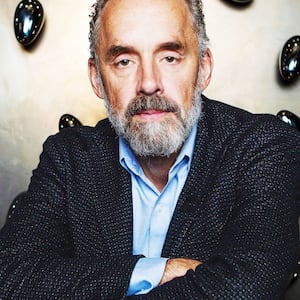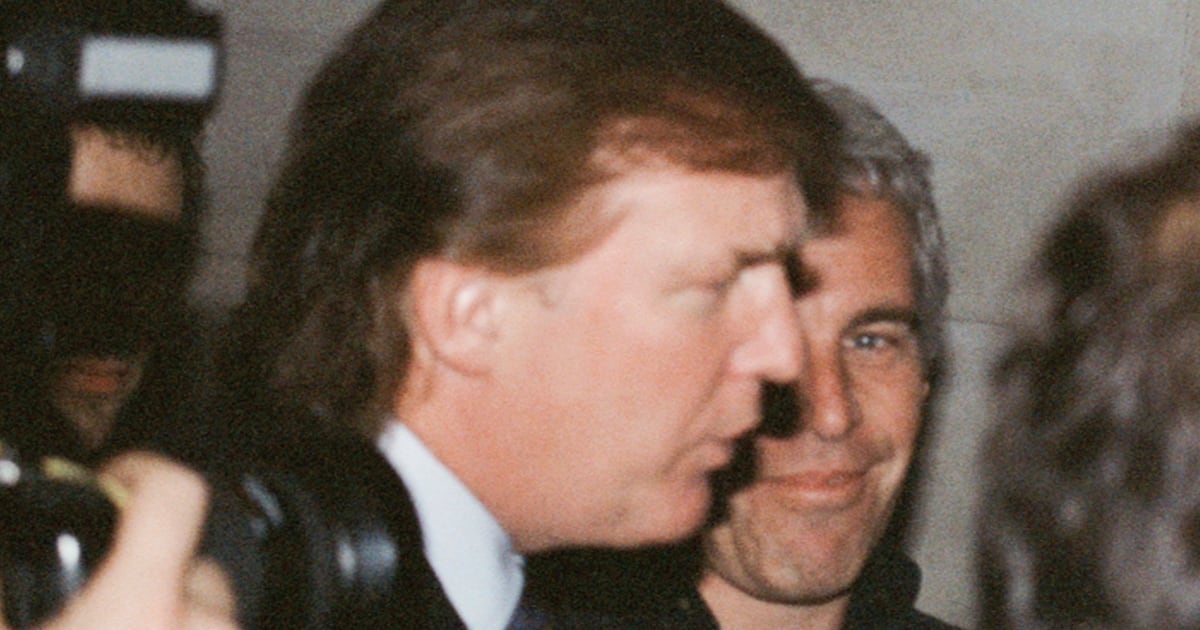Get more news and opinions in the twice-daily Beast Digest newsletter. Don’t miss the next big story, sign up here.
Jordan Peterson has undergone the worst possible transition for a pop-culture intellectual. He has become boring. He is largely played out—not as a prominent and popular figure with a committed, even growing fanbase; but as a compelling and consequential figure capable of shifting the needle in the wider public discourse.
The issue isn’t whether his positions and sentiments resonate as strongly as ever with his followers—they do. The issue is the forfeiture, of his withdrawing from the war for hearts and minds in the malleable middle, where social narratives are effectively contested.
He has squandered his agency, and openly positioned himself as just another embittered culture warrior. He regularly becomes ensnared in public or institutional spats that bring out the worst in everyone.
His Twitter feed is a repository of bitter invective, demagoguery, and reactionary grievances. And his seeming need to view everything through the prism of his own personal culture war leads him to make some truly embarrassing proclamations, like when he recently retweeted a clip purporting to have originated out of China, featuring naked males confined in beds, each with a “milking” apparatus attached to them. Peterson quote-tweeted: “Such fun in unbelievable techno-nightmare CCP hell.” It turned out the clip actually derived from a U.K. porn fetish video, issued by someone called “Mistress Jane.”
Before emerging as a public intellectual, Jordan Peterson taught in the faculty of psychology at the University of Toronto. His early online lectures were delivered with verve, authenticity, and a tangible appreciation for the array of interests he drew upon for material in his first book, Maps of Meaning: The Architecture of Belief, which combined psychology, mythology, religion, literature, philosophy, and neuroscience to analyze systems of belief.
Peterson was troubled by a federal amendment to add gender identity and expression to the Canadian Human Rights Act as prohibited grounds for discrimination. He argued that the bill would make the use of certain gender pronouns “compelled speech.” In short order, his views on cultural and political issues drew acclaim, notoriety and a coterie of followers.
In relating his argument about “compelled speech” to a general critique of identity politics, Peterson became a focal point for what was then a somewhat inchoate and centerless dislike of what would popularly become known as “wokeness.” Peterson emerged at exactly the right moment as a mix of academic rabble rouser, uniquely not from the left, combined with elements of the pop culture intellectual, and with further elements of the provocateur, contrarian and essayist, comparable in some ways to the likes of Gore Vidal and Christopher Hitchens.
He was similar to them in their critiques of hierarchies of power and cultural sacred cows, but differed in that, whilst they could be au courant and hedonistic, he was pronouncedly more straight-laced; and whereas they had an equal disdain for the crass ignorance and hypocrisies of the right and the flakier aspects of the left, Peterson was by his own admission a traditionalist.

Jordan Peterson speaks in Amsterdam, on Oct. 31, 2018.
Romy Arroyo Fernandez/NurPhoto via Getty ImagesMany of his resentments were hardly new: marginalized groups are systemically corralled into victimhood and offense-taking; political correctness inhibits freedom of thought and speech, and a sinister blend of neo-Marxism and postmodernism undermines identity and responsibility. But he appeared to bring heavyweight academic rigor to standard complaints about “social-justice warriors.” He claimed that ideas intrinsic to social justice movements, such as the patriarchy and other forms of structural oppression, are illusory and treacherous, and that he could prove this with science. “I hit a hornets’ nest at the most propitious time,” he later reflected.
Peterson’s lectures and conversations soon gathered millions of views. In 2018, he published his bestselling second book: 12 Rules for Life: An Antidote to Chaos. With chapters such as “Stand Up Straight With Your Shoulders back,” “Treat Yourself Like You Are Someone You Are Responsible for Helping,” and “Set Your House In Perfect Order Before You Criticize the World,” the book was full of hokey, time-honored verities. A central idea was that “suffering is built into the structure of being,” and although it can be unbearable, people have a choice either to withdraw, which is a “suicidal gesture,” or to face and transcend it.
The other parts of the work explored and criticized the state of contemporary masculinity; the upbringing that ignores sex differences between boys and girls; moral nihilism; relativism; and lack of respect for the values that built Western society.
The parts of the work criticizing the state of young men had a massive catalyzing effect, becoming, for many young male adherents, a practical and welcome framing device through which to see and begin to alter their lives.
As part of the promotion, Peterson assented to an interview on Britain’s Channel 4 with a slightly listless and cagey Cathy Newman, an exchange that, catching and framing Peterson’s rollicking momentum, went viral. The more Newman flat-footedly paraphrased his beliefs, the better Peterson came across, bolstering his preferred image as the coolly rational man unfazed by the histrionics of political correctness.
Much of Peterson’s appeal seemed to stem from his pulling no punches in asking young men to account for themselves and take responsibility for their own betterment, and framing this in terms of a noble and decent undertaking, a model with roots and precursors stretching back through history, literature, myth and philosophy. He simultaneously created a permission structure for them to critique and pushback against what he defined as a corrosive cultural relativism that was deconstructing and devaluing masculinity, rather than positing it as something to aspire to develop on the way to self-realization.

Jordan Peterson addresses students at The Cambridge Union on Nov. 2, 2018 in Cambridge, Cambridgeshire.
Chris Williamson/Getty ImagesHe also strongly emphasized existing research that showed, contrary to the beliefs and efforts of the social constructivists, that gender differences, in the most egalitarian societies, actually maximized, showing that gender proclivities between men and women were real and not abstract or constructed, and that when given the ideal circumstances to do so, those proclivities would come to the fore—the exact opposite of what the social constructivists were hoping for.
Young men could look to Peterson, and quote him, as a figure within academia where, in his estimation, the worst excesses of woke deconstruction were being indulged in humanities faculties, and being propagated into the political and cultural mainstream without being contested. Such young men now had their academic firebrand. His beliefs attracted a heterogeneous audience that included atheist libertarians, Christian conservatives, and moderate liberals a little wan and wary of the prissier elements within liberalism. Even among many skeptics, he was considered, to varying degrees, legitimate and relevant.
But even at this height in his influence and popularity, many of his lesser qualities, ones that would later become more pronounced, were also already in evidence: a disparagement of the left’s efforts to portray him as a reactionary caricature, when he himself had gone to some lengths, slicking back his hair and choosing ensembles of checked suits and silk waistcoats, posing imperiously in photographs and generally cultivating a vaguely Machiavellian, debonair public persona; a querulousness, an initial amenability and receptivity that would give way to a kind of crotchety standoffishness, and an absence of the qualities of irony and wit that made the likes of Gore Vidal and Christopher Hitchens so compelling.
Can’t get enough from The Daily Beast? Subscribe to the twice-daily Beast Digest newsletter here.
Nevertheless, during this high noon of Jordan Peterson’s cultural influence, there were two significant appearances. One was at Oxford, where he held forth before a receptive audience, in the heart of the academic establishment.
The second, and for me the most crucial appearance around this time, was when he joined the actor and comedian Stephen Fry in a Munk debate against New York Times journalist Michelle Goldberg and distinguished academic and author Michael Eric Dyson, to discuss whether political correctness was an enemy of free speech.
It stood out as a unique opportunity: political correctness critiqued through an intellectual collaboration between a self-described “liberal of the most milquetoast variety” in Stephen Fry—who was trying to distinguish between the robust, relatable, and decent elements of liberalism and the strident, flakier excesses of identity politics—and a self-proclaimed “classic British Liberal” in Peterson—challenging political correctness from the perspective of someone bristling at compelled speech and academic activism.

Jordan Peterson speaking at the 2018 Young Women's Leadership Summit hosted by Turning Point USA in Dallas, Texas.
Gage SkidmoreThe promise of such a collaboration, and its effectiveness and coherence on stage, was enormous—an ideological coalition that, if properly followed up on or expanded with multiple iterations of other partners and crossovers, could have brought to bear the intellectual prowess and energies of liberalism onto the more prissy extremes of identity politics and political correctness, and made the left, as a broader idea, more palatable to the mainstream.
As it happened, shortly after these appearances, Jordan Peterson was faced with a string of crises. After his wife Tammy was diagnosed with a rare form of kidney cancer, he was prescribed benzodiazepines to quell his anxiety, only to find himself dependent, and critically sick.
His return was gradual, but he found himself, in his own words, forgiven by his audience. “Here I am this guy, I’m a clinical psychologist, I got tangled up with benzodiazepines. I’m talking to people about getting their house in order, and things collapse around me.” He approached his return with the hypothesis of “including myself in the audience of reprobates to whom I’m lecturing. I don’t assume that I abide by all these rules. There are targets for attainment, and hopefully, that has protected me at least to some degree, against the perception of undue moral superiority…”
At this point, he had lost much of his luster as a contrarian, which, to a large degree, is reliant, as a trope, on a perception of redoubtable toughness and composure. In some quarters he was being perceived as a bit of a spent force or an eccentric.
He had written a follow-up to 12 Rules for Life that, no doubt personally cathartic and a salve as an academic and expressive exercise, was nonetheless seen by many as him pawing in the same old litterbox. He would sign up to a content distribution deal with conservative media company the Daily Wire, further placing him outside the mainstream discourse, and emphatically cordoning off a left or center-left audience who might retain some interest in his perspectives.
In a novel by Alan Hollinghurst, one character laments of another: “He has become more brutal, more sentimental.” This is an apposite phrase for Peterson, whose personality seemed to maximize, with him, in interviews, coming across as sentimental, maudlin, lachrymose, and easily susceptible to open weeping; but his resentment and invective toward perceived outrages of woke ideology also maximized.
He lambasts liberal politics in Western Democracies, Canada in particular; but his criticisms of autocratic impulses and trends on the right, in the West, are dispassionate and muted, often tweeted out as a subordinate clause amidst some other preoccupation.
For the most part, Peterson now dwells in a limited right-wing and libertarian ecosystem of podcasters and social media.
Elon Musk let Peterson back on Twitter after he had been suspended for refusing to stop misgendering and “deadnaming” actor Elliot Page. His once dynamically formulated grievances in relation to prevailing attitudes around the topic were now almost embarrassingly undermined by truculent language. His posts sometimes positively highlight the plight of young women in Iran and other worthy causes and issues, but are more frequently, and dispiritingly, close to the banal invective laced with hyperbole and cheap sarcasm that can be found practically anywhere.
He tweets to promote a lecture intended to discuss the “undeniable need for fossil fuels, and the toxic underlying nihilism of the ‘climate concerned’ left.” He describes Canadian plans to make all new cars emissions-free by 2035 as “Utterly deluded and criminally virtue-signaling,” and exclaims, “Keep your damned hands off my car, Justin Trudeau or face the consequences.” He declares the “Twitter Files” as “truly worse than Nixon’s Watergate.”
Peterson now describes medical specialists working with trans youth—a subject he had only a few years prior argued about uncompromisingly, but on a sound intellectual footing, and with rhetorical control—as “pandering cowardly medical ‘professionals’ utterly inexcusably castrating them,” and labels them “sanctimonious butchers.”
He opted to wear a tuxedo while on Joe Rogan’s podcast, and reappeared on the podcast recently wearing a two-toned devil and angel suit. He tweets at his bête noire Justin Trudeau upwards of three or four times a day. He described Tucker Carlson as having “a streak of comedic genius.”
For an academic who ought to be scrupulous in his sources, Peterson frequently cites or retweets dubious sites full of spurious facts. He retweets an obscure and dubious “scientist” who claims to be peer-reviewed, despite an investigation casting doubt on the validity of the internal review process of the foundation where she posts. He retweets a vulgar, horribly vicious, almost singularly anti-trans site.
In response to a trans ad on menstruation, Peterson tweets, “Where’s Nelson Muntz when you need him,” a reference to the Simpsons bully, who he previously wrote about as a symbolic figure whose bullying provides a necessary corrective to resentful, touchy or effete kids.
While still popular, his shrunken influence on the broader culture and ideological spectrum, maximized resentments and reactive rather than framing or paradigm shifting rhetoric has given him the feel of a public figure who is largely played out.
Occasionally, there will be perspectives that almost hauntingly evoke the globe-trotting figure of a few years back, but he no longer has a claim to being a mainstream, enduring academic provocateur. Instead, he’s become the worst thing a pop-psychologist can be—boring.
Sign up for the Beast Digest, a twice-daily run down on each day’s top stories. Don’t miss out, sign up here.












